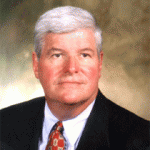Put the children first.
Stay the course with higher standards and quality assessments.
Fund early childhood education and focus on literacy.
Elevate the teaching profession.
Those were Tuesday’s key messages from two national educators: David Driscoll, a commissioner of education for the commonwealth of Massachusetts, and Eric Smith, a commissioner of education to Florida.
Driscoll and Smith spoke to a crowd of about 100 and took questions during a free, 90-minute forum in Boise, part of the Ed Sessions 2.0 series and sponsored by the J.A. and Kathryn Albertson Foundation.

The two lifelong educators said it is essential that Idahoans ensure equality for all kids, stabilize school funding and master teacher evaluations.
They shared what they consider mandatory characteristics for a state superintendent; Idaho superintendent’s candidates Sherri Ybarra and Jana Jones were both there to listen.
“You have an incredible responsibility to bring equity to the children you are fortunate to serve. You’ve got to be mission-driven, you can’t be weak at heart, and your mission needs to be to meet the needs of all the children,” Smith said. “And if you don’t think you have that ability, get out of the way — quick.”
Driscoll said a state education leader must have thick skin, be tough and hard-working and remember that “it’s complicated because you are dealing with kids’ lives. … Sometimes the only meal they get are in the schools.”
They also talked about what’s missing in American education.
“We’ve lost that drive,” Driscoll said. “The problem is the world has gone by us because their kids work harder and they go to school longer. Our kids need to be held to higher standard, not because we want to punish them but because we love them.”

The missing ingredient, said Smith, is that Americans don’t elevate classroom teachers as respected professionals.
Driscoll was more passionate about integrating technology in schools, saying it can do so many things if it is used properly but “that takes hard work.”
Smith wants educators to be more selective about the tools they choose to use. “There are lots of ways to deliver quality instruction. I support technology but I’ve seen it used so badly.”
Both agreed that more money doesn’t mean better academic results. But stable funding sources can help.
“I’ve never been employed in a place where we had enough money … and we didn’t change our mission of working for kids,” Smith said.
Driscoll said that one of the most frustrating things across the country, in any state or school district, is there are high-performing schools and low-performing schools. “It’s all over the place. There’s no consistency. Money doesn’t matter.”
Smith passionately told the crowd to remember the purpose of public education: “to provide the opportunity for a child to overcome the situation they were born into. Our role is to be able to bridge the gap for children that might not have as many opportunities.”
Predicting the future, Driscoll and Smith both complimented the progress of Common Core Standards and assessments that will likely continue in 35 to 40 states over the next two years.
“You will see for the first time in history, millions and millions being tested on the same level,” Driscoll said. “We will have strong standards and strong assessments and finally we’ll know what we need to work on.”
Smith added: “We’ve got to stay with it.”
Click here for more complete bios of the speakers and an archived video of the event.
NOTE: Nancy S. Grasmick, who served as state superintendent Maryland Public Schools for 20 years, was supposed to attend but canceled because of an injury.
Disclosure: The Ed Sessions 2.0 series and Idaho Education News are both funded by the J.A. and Kathryn Albertson Foundation.
